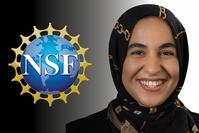Purdue ENE collaborative research project aims to develop reflexivity in engineers
| Author: | Jeanine Shannon |
|---|
Research suggests that engineers have been conditioned to perceive themselves as superior to non-engineers in their ability to solve problems. Purdue University School of Engineering Education's Amena Shermadou and her colleagues want to disrupt these implicit beliefs by identifying opportunities for supporting engineering students in developing reflexivity – a practice of reflecting on one’s actions and beliefs – when addressing socio-technical challenges.
Funded by the National Science Foundation’s Division of Engineering Education and Centers, the three-year, $349K project will explore methods for accessing and characterizing implicit beliefs engineering students hold about the value of diverse perspectives in engineering service-learning environments.
“For engineers, harboring beliefs of superiority over non-engineers can have negative implications on their ability to approach socio-technical problems in equitable ways,” said Shermadou, a Purdue ENE Visiting Assistant Professor. “We aim to reframe this mindset within engineering students through fostering reflexivity, ultimately paving the way for more egalitarian approaches to problem-solving within engineering practice.”
The research team—which includes David Delaine and Emily Dringenberg from The Ohio State University’s Department of Engineering Education—aims to identify practical ways to access engineering students’ implicit beliefs in the service-learning context. The team will collaborate with community partners, students, and instructors to enhance service-learning practice by exploring opportunities to integrate reflexive awareness of implicit beliefs within the curriculum.

